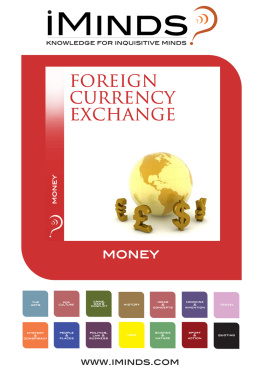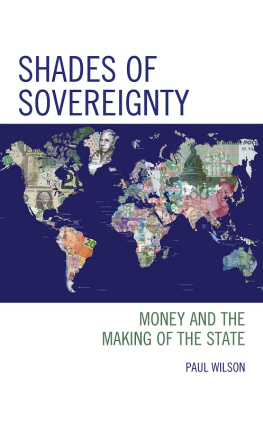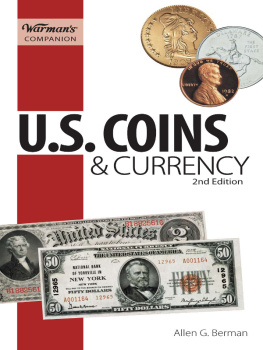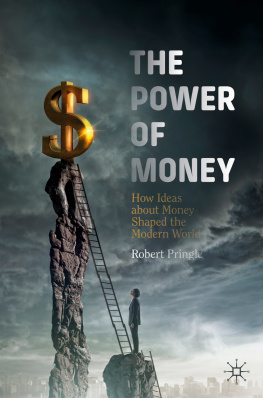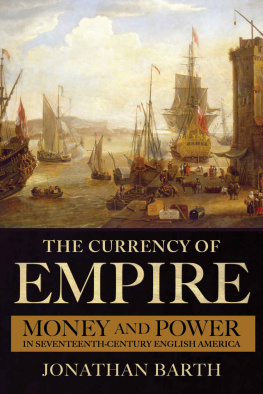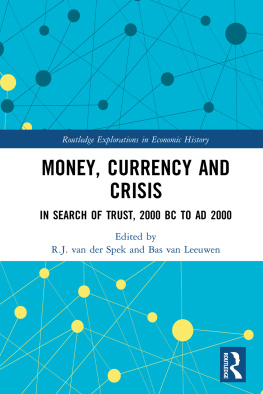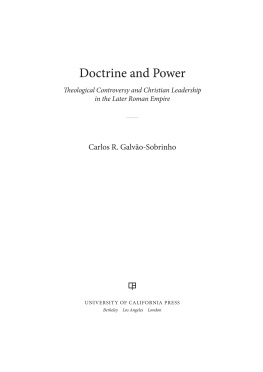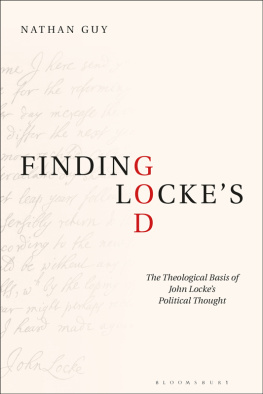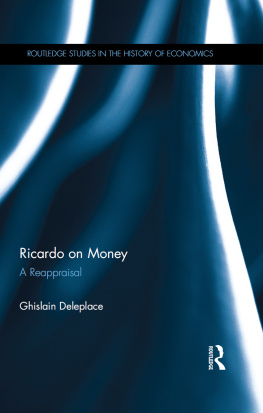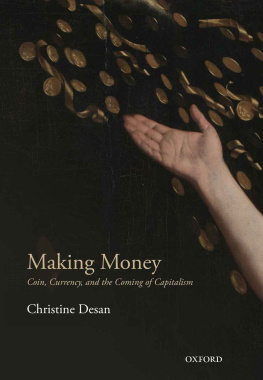Cultural Memory in the Present
Hent de Vries, Editor
DIVINE CURRENCY
The Theological Power of Money in the West
Devin Singh
STANFORD UNIVERSITY PRESS
STANFORD, CALIFORNIA
Stanford University Press
Stanford, California
2018 by the Board of Trustees of the Leland Stanford Junior University.
All rights reserved.
No part of this book may be reproduced or transmitted in any form or by any means, electronic or mechanical, including photocopying and recording, or in any information storage or retrieval system without the prior written permission of Stanford University Press.
Printed in the United States of America on acid-free, archival-quality paper
Library of Congress Cataloging-in-Publication Data
Names: Singh, Devin, author.
Title: Divine currency : the theological power of money in the West / Devin Singh.
Description: Stanford, California : Stanford University Press, 2018. | Series: Cultural memory in the present | Includes bibliographical references and index.
Identifiers: LCCN 2017038483 (print) | LCCN 2017041114 (ebook) | ISBN 9781503605671 (ebook) | ISBN 9781503604827 (cloth : alk. paper) | ISBN 9781503605664 (pbk. : alk. paper)
Subjects: LCSH: MoneyReligious aspectsChristianityHistory of doctrines. | EconomicsReligious aspectsChristianityHistory of doctrines. | Political theology.
Classification: LCC BR115.W4 (ebook) | LCC BR115.W4 S56 2017 (print) | DDC 261.8/5dc23
LC record available at https://lccn.loc.gov/2017038483
Contents
Acknowledgments
This study explores money, which marks relationships of credit and debt and, hence, obligation. It is altogether fitting that I acknowledge the debtsintellectual, relational, and financialthat made this project possible. Special thanks go to Emily-Jane Cohen for her enthusiastic support and advocacy for this book from the beginning. My heartfelt thanks go to a dedicated and generous group of readers who offered substantive feedback on the entire manuscript: Ethan Fairbanks, Hille Haker, Dotan Leshem, Luke Moorhead, Michael Motia, Roberto Sirvent, and two anonymous reviewers.
Appreciation goes to my colleagues and students at Dartmouth College and Yale University for discussions and insights that shaped my thinking on these matters. Special thanks go particularly to Dudley Andrew, Christopher Beeley, Stephen Davis, Philip Gorski, David Singh Grewal, Noreen Khawaja, Kathryn Lofton, Dale Martin, Eliyahu Stern, Kathryn Tanner, Linn Marie Tonstad, Emilie Townes, Denys Turner, Miroslav Volf, Frederick Wherry, and Andre Willis. A special word of gratitude goes to the supportive conversation partners at the Yale Marxism and Cultural Theory Working Group, especially Michael Denning, Moira Fradinger, John MacKay, A. Naomi Paik, and Caleb Smith.
A number of interlocutors along the way have impacted my thinking as it relates to the themes explored in this project. I am grateful for conversations with Luke Bretherton, Elizabeth Bruno, Kati Curts, David DeVore, Nigel Dodd, Marko Geslani, Yvette Gomez, George Gonzalez, Philip Goodchild, Marion Grau, Michael Hollerich, Ana Ilievska, Karin Knorr Cetina, Kwok Pui Lan, Yii-Jan Lin, Vincent Lloyd, Charles Mathewes, Christina McRorie, David Newheiser, Kristine Olson, Hollis Phelps, Kathryn Reklis, John Roberts, Erin Runions, Raphael Sartorius, Daniel Schriever, Daniel Schultz, Shauna Lee Sexsmith, Charles Stang, Michael Thate, and Kevin Wilkinson.
Research for this study was supported in part by Dartmouth College, Yale University, the Forum for Theological Exploration, and the Mrs. Giles Whiting Foundation, whom I gratefully acknowledge. A generous First Book Grant from the Louisville Institute enabled completion of this project, which was also recognized by the Manfred Lautenschlaeger Stiftung and the Forschungszentrum Internationale und Interdisziplinre Theologie at the University of Heidelberg. Special thanks to Michael Welker and the Lautenschlaeger family for their support.
Finally, my deep gratitude for good humor and support goes to Marcelo Ramagem, Gopal Swamy, Kuo-Lai Wong, and the Singh and Thompson families. Special thanks go to Nicole March for being a force of overwhelming goodness and love in my life. Finally, thanks to my mother, Randal Joy Thompson, to whom this book is dedicated and without whom none of this would have been possible.
Introduction
It has become commonplace today to speak of a widespread, so-called faith and hope in money and markets. The ubiquitous power and influence of the economy appear to require, or at least inspire, religious language and invocations of the divine. Economic institutions may sometimes be described as idols or demigods dictating the lives and destinies of millions. Money is depicted as an object of worship, as enthusiastic participants in the global economy prostrate themselves before the altars of capital, seeking economic salvation. These are usually no more than passing allusions or fleeting attempts at evocative metaphor. But such ascriptions and the links they imply have long-standing foundations.
The tendency to highlight moneys purportedly religious dynamics can be traced in part to the ways in which economic ideas and activity have actually interacted with religious thought and practice over the centuries in Western societies. This book initiates an investigation of these connections between money and Christian theology, following the intuition that the development of the economy in the West is marked by an ongoing relation between these two spheres. I claim that portrayals of monetary acquisition as a spiritual quest, or of economic processes and powers as infused with religious characteristics, are in part the result of concrete conceptual and institutional resonance between talk about God and the nature and uses of money.
Particular early Christian theological ideas incorporate and retain traces of monetary economy. Monetary language, concepts, and practices prove useful in clarifying and formalizing certain emerging and central theological claims. This infusion of monetary thought and practice into core Christian doctrine means that Christian ideas, practices, and traditions help to convey this theological and economic combination into new social and political formations and legitimate evolving customs and institutions of monetary economy. If money lends its logic to the structuring of theology, God-talk repays by offering its prestige and sacred power to the world of exchange.
This book, therefore, coincides with studies of the partially theological sources of the modern economy. It also participates in broader considerations of the theological heritage of modern politics and statecraft, for it is my assumption that money and economy cannot be adequately grasped apart from matters of sovereignty and law. This investigation demonstrates that these connections among monetary economy, politics, and religious thought and practice have been present since key founding moments of the Western imaginary.
Rather than attempting a wide-ranging genealogy or documenting the longue dure of theological economic development, I consider several ancient points of interaction or resonance between money and theology. Moreover, although Judaic and Islamic theological traditions also interface with monetary economy, and both should be considered significant contributors to Western legacy, I focus on Christian thought. Christian theology persists as a central authorizing discourse in the development of Western societies and self-understanding. My study adds an additional perspective to the growing body of literature assessing the residual yet persistent Christian theological legacyboth explicit and implicitin modern politics and economy. Widespread social and institutional influence by Christianity began at least as early as the fourth century, and the discourses I consider took place in this formative period of Christian theology and empire.
Next page

